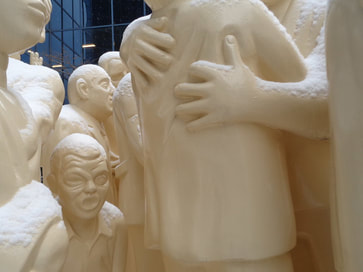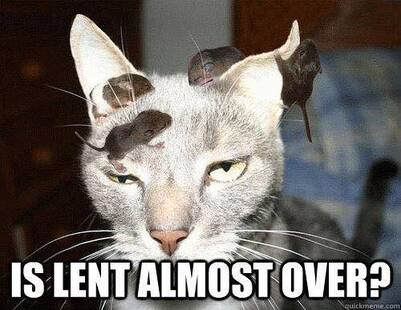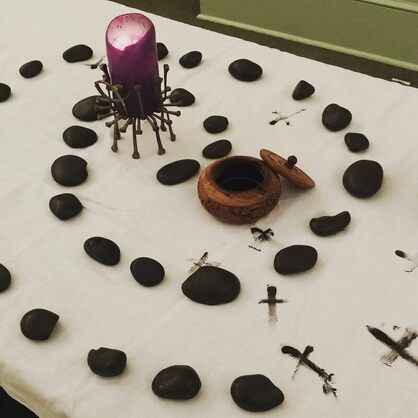 Luke 12: 41-48 Peter said, “Lord, are you telling this parable for us or for everyone?” And the Lord said, “Who then is the faithful and prudent manager whom his master will put in charge of his slaves, to give them their allowance of food at the proper time? Blessed is that slave whom his master will find at work when he arrives. Truly I tell you, he will put that one in charge of all his possessions. But if that slave says to himself, ‘My master is delayed in coming,’ and if he begins to beat the other slaves, men and women, and to eat and drink and get drunk, the master of that slave will come on a day when he does not expect him and at an hour that he does not know, and will cut him in pieces, and put him with the unfaithful. That slave who knew what his master wanted, but did not prepare himself or do what was wanted, will receive a severe beating. But the one who did not know and did what deserved a beating will receive a light beating. From everyone to whom much has been given, much will be required; and from the one to whom much has been entrusted, even more will be demanded. Thank goodness Luke tends to tie all of the passages in each chapter of the gospel together; that we can look for one story to build on another, and find a common thread tying them together. Without it, today's passage sticks out like a sharp knife that, after reading this passage, one might decide to turn on oneself! My goodness- that, should the slave not do the right thing the "master will chop them to bits?" What kind of a parable is this? And why would Jesus tell it in this way, especially to his disciples? What does it mean for present day disciples? Does our behavior count after all? Will we be judged among the "faithful" or... Take me now Lord!
Breathe.... Remember the words of Meister Eckhart: It is a lie, any talk of God that does not comfort you... This is admittedly a difficult teaching. And, it's a parable. Which means we must resist the most obvious way of reading and interpreting, namely, making God the angry owner who comes wielding a sword, eager to slice us to bits when we've made a mess of things. We also have to take care to look at the context, the setting, the customs and people, and what their understanding of this parable might have been. Then, and this is the most difficult part, we must turn the mirror on ourselves and see what it might meant to us. Jesus was speaking to his disciples. He had taken them aside, due to the growing crowds, to talk with them about what to expect, how to lead, and what to look out for. He had warned them not to fall into the same traps as other religious leaders. Paraphrasing: 'Don't start running this ministry like a business; like any other corporation. Don't make it difficult for the people, burdening them, overpowering them, oppressing them; don't start acting like you are the CEO of a company trying to manage everyone and everything. That will never work out well. Put your priorities straight. Don't be like the guy with the "bigger barns," but know that God will provide everything you need. Don't worry. Stay alert. You have a light inside you that shines out to the world, and take care to keep it lit and full of love. It's easy to let darkness in, our thoughts, our humanness, our greed, and everything the world tells us we need to get by... instead, stick with the teachings, stay with love, and be intentional about it.' And Peter asks: Jesus, do you mean everybody or just us? Jesus doesn't directly answer Peter. Instead he gives them a framework for what they knew to be true abut the world. If you do a good job, you'll be rewarded, and if not you'll be fired (cut to bits). If you know what to do and don't do it, it will be worse for you. If you don't know what to do and do the wrong thing, that will also be bad for you. In the same way, Jesus illustrates through this parable, if we follow the way to peace, we will be rewarded with peace; we will know a world of and a people of peace. If we do not follow the way to peace, it (the world) will not go well for us. We will be broken, angry, violent, and severed from one another. If we know what to do and do not do it, it will be even worse for us, because we knew and did nothing; and that pain will cut us to the quick (to bits). If we don't know, it will still be bad for us; we won't realize peace, but not as bad as those who knew what to do and did not do it, because we won't know what we're missing. The disciples would be leading a movement. The purpose of the movement is to usher in a world of peace: shalom. Jesus was teaching them the way to do that. He had previously laid out his teachings. He had illustrated what must happen in order for the world to realize peace. 'Do not respond to evil with violence/turn the other cheek. Do not judge/do not be angry. Live with all people in love/forgive. Don't make promises you can't/won't keep. Pray for your 'enemies'/people who are not like you. ' These teachings are the key to the realizing peace on earth, according to Jesus. That we live for more than ourselves. That we turn from that life of one, and embrace a life in service to others. The teachers, leaders, ministers, disciples, were given a huge responsibility. They would get tired. They would feel burned out. They would not be wealthy. They would not be popular. They would be criticized and chastised and crucified. Yet as we will see in the coming passages, the ones who follow these teachings, even though it may be difficult, will live a better, more fulfilled life than any who worked for themselves. Would you be willing to meditate on the teachings of Jesus this day? (You will find comfort) How might following those teachings enhance your life? How might you turn from a world of one, to a life of service to others? Peace, Pastor Linda
0 Comments
 Luke 12:35-40 Be dressed for action and have your lamps lit; be like those who are waiting for their master to return from the wedding banquet, so that they may open the door for him as soon as he comes and knocks. Blessed are those slaves whom the master finds alert when he comes; truly I tell you, he will fasten his belt and have them sit down to eat, and he will come and serve them. If he comes during the middle of the night, or near dawn, and finds them so, blessed are those slaves. “But know this: if the owner of the house had known at what hour the thief was coming, he would not have let his house be broken into. You also must be ready, for the Son of Man is coming at an unexpected hour.” We live each day both in the knowledge and in the denial of our own mortality. Our light, as Jesus calls it, is with us for just a short while. It burns within us like a lamp, this spark of divine light, and it feels wonderful to be alive most days. What a gift- to breathe, to be among the living- in whatever physical state we may be. Life is a gift because God has given it to us. We worry about losing it and surround ourselves with stuff to give us a sense of security, and permanence. We want to leave a legacy; to be remembered.
But Jesus tells us, "You cannot make one hair on your head white or black, you can not add one inch to your height..." and "which of you by worrying can add one hour to your life?" These statements, while they speak of God's care for us, also unsettle us; that the lives we've been given, in reality, don't belong to us, but belong to the One who created us. We live In deaths shadow. (I know, It's not the most uplifting thing I've ever written.) That awareness however, brings an urgency to life; to living! That we are finite creatures, not knowing what year or day or hour we might be returned to God's arms, makes every second count. But it also frees us from getting swept up in things that don't bring real fulfillment to our lives; things that don't last. Tolstoy wrote: Our lives are passed in the presence of death. While working individually for your future, you well know that the future will give you nothing but death. And death will destroy all you worked for. Thus, it is clear that life for oneself can never have any meaning... we must live so that death cannot destroy our life. Jesus gives us, through his life, an illustration of what a fulfilled life looks like. One turns from the things the world values, (money, power, ego) and embraces a life of service to others. It prompts me to think about the things in my own life that bring fulfillment, meaning, purpose, joy... Sometimes I put off doing those things, or being with those people, praying for, healing those relationships, or donating toward those causes. I find other things to distract me (Martha, Martha). Yet, we don't know the hour when the thief is coming. So Jesus encourages us, to be alert; keep our lamps lit. And Let your light shine before all. Live each moment doing the things that matter, with the people they matter to; live for those whose lives might be made better through our actions. When we live for the things the world values, our lives are lost. Moth and rust destroys all we've worked for. When we live for others we live beyond our lives; we participate In something bigger than ourselves. Living out the teachings of Jesus brings us to a place of true happiness where our lamps shine with the eternal light of God within us, that nothing can destroy. Peace and Light to you, Pastor Linda  Luke 12: 4-12 I tell you, my friends, do not fear those who kill the body, and after that can do nothing more. But I will warn you whom to fear: fear the one who, after one has killed, has authority to cast into hell.[Gehenna] Yes, I tell you, fear that one! Are not five sparrows sold for two pennies? Yet not one of them is forgotten in God’s sight. But even the hairs of your head are all counted. Do not be afraid; you are of more value than many sparrows. “And I tell you, everyone who acknowledges me before others, the Son of Man also will acknowledge before the angels of God; but whoever denies me before others will be denied before the angels of God. And everyone who speaks a word against the Son of Man will be forgiven; but whoever blasphemes against the Holy Spirit will not be forgiven. When they bring you before the synagogues, the rulers, and the authorities, do not worry about how you are to defend yourselves or what you are to say; for the Holy Spirit will teach you at that very hour what you ought to say.” Jesus is speaking to his disciples. The crowds around them had grown into the thousands, and they were trampling each other, so Jesus called his key leaders together for a private chat. And after warning them about the "Yeast of the Pharisees" (see post from March 5) he moves into the next phase of the 'pep talk.' Don't be afraid.
Don't be afraid. This is something I need to hear Jesus say. Every. Single. Day. One would think that after so many years as a Christian, and so many years in pastoral ministry I wouldn't need a daily reminder. But, every day, I am faced with the challenges brought about by living according to the teachings of Jesus that cause me to swim against the current of the world. Every day I live in tension with my participation vs. compliance in corrupt and unjust systems. Every day I work to dismantle those systems through my vocation, my voice, my actions, and my prayers. All of that to say that every day I am confronted in some way by the powers and people of the world who not only disagree with me, but would be willing to cast me into Gehenna (a garbage dump). And so it was for the disciples... The disciples could have opted out. Surely they were alarmed from time to time as they saw Jesus go against the system again and again; he wasn't backing down. He was putting, not just his, but their lives at risk. He told them, warned them, of the sacrifice necessary to bring this new world about. Not resisting evil, taking a stand of non-violence, not getting angry, unconditional forgiveness... I mean, what else do Christ's teachings look like when played out but sacrifice? Jesus reminds them of three things through this portion of the pep talk: 1. They belong to God; they loved, cared for, provided for, cherished. God brought this world into being, brought them into being, and knows everything about them down to the last hair on their heads. God will never leave them alone; they are valuable to God. 2. In living out discipleship they become walking billboards that acknowledge who they are, and whose they are. Their lives speak about the God they serve, and others will see their lives as both a witness and an inspiration. When they don't live out the lives they are called to, they deny (grieve) the Holy Spirit working in and through them and the world. That they "cannot be forgiven" simply means they can not (are choosing not) to live in the freedom Christ offers; in the light of love. Christ offers a better way. 3. As the ministry moves forward and the movement grows, they will definitely face resistance from those in power who feel threatened and fearful of the bringing about of Christ's way. God will provide words, strength, and courage when that happens. Don't be afraid, disciples . You are loved. Let your life speak. Stand in God's light. Peace,. Pastor Linda  Luke 12:1-3 Meanwhile, when the crowd gathered by the thousands, so that they trampled on one another, he began to speak first to his disciples, “Beware of the yeast of the Pharisees, that is, their hypocrisy. Nothing is covered up that will not be uncovered, and nothing secret that will not become known. Therefore whatever you have said in the dark will be heard in the light, and what you have whispered behind closed doors will be proclaimed from the housetops. When there is a crowd of thousands trampling each other to get in the front door of your church, what do you do? Most of us have not had that experience, but just in case we are ever faced with that problem, Jesus gives us a clue. You call a meeting. You gather your key leaders and give them a 'pep' talk or, in Jesus’s case, a warning.
"Beware the yeast of the Pharisees," he says, "that is, their hypocrisy." Translated: the Pharisees are pretenders, actors, not what they appear to be. I will resist my usual urge to defend the Pharisees for living into what they were trained to do, socialized to do, and blinded to... If you are a regular reader you've heard it already; they were doing what they believed was right. Let's talk instead, about how they might have gotten there. How did the Pharisees become so misguided? And how can we protect ourselves from falling into the same trap? Jesus's ministry started out simple enough. It was centered on the basics: living out God's saving and healing love, bringing those on the margins into the center, naming and casting out individual and societal demons, and bringing wholeness to the broken. And it was a great ministry! So great that everywhere Jesus went, the crowds increased- to the point where they were in the thousands! This was a tipping point for the ministry. The crowds needed to be managed; without intervention they would hurt themselves and others. ("Trampling one another" can happen in a variety of ways, amen?) Jesus knew that as crowds swell around a ministry or minister, or around a church, the temptation to begin to run that church like any other worldly institution, also swells. Now, on the surface, that doesn’t seem like such a bad thing, does it? Aren’t we supposed to encourage church growth? Don’t we need a business sense to best operate the business of the church? Sort of… The thing is, we can get so swept up in the “business,” and the numbers- how many, how much, how often- that the mission of the church sometimes gets diminished. Jesus addressed the Pharisees about this issue many times; that they were, in keeping their rules and rituals, missing the heart and spirit of real ministry. When we run church like a business, we begin to think like business owners: “How will we attract and keep new customers? What will make our customers come back again and again? What is our profit margin? How will we maintain our business space/building and make it functional and attractive so people will want to be there/shop longer/buy/give more.” From those questions we create: programs, activities, better/more engaging/entertaining worship, committees, giving plans, budgets, goals for ‘us’ and ‘our people.’ Our mindset then brings us to managing all of these people, programs, and plans; so we make rules, complete with incentives as well as consequences. We become focused on OUR business. And yes, God is still in the mix somewhere, but sometimes, even our sense of spirituality runs second to running the church. This, Is what happened to the Pharisees. There were 613 laws to keep. There were countless rituals to perform. There were services to lead. There were state and government taxes and laws to follow, and for the Jewish leaders had to report to Romans, even for the simplest things like getting a key to their own supply closet. So, moving religion closer to a conventional institution happened gradually, and slowly. The burdens placed on the people didn't happen overnight; it was one little restriction at a time. Aside: That's why It's so Important to American Baptists to keep separation of church and state firmly in place- but thats another blog post for another day... Jesus came to uncover all of this- 'nothing stays hidden' where Jesus is present. He came to lift that burden of business, and return us back to who we are meant to be. Beware the yeast of the Pharisees. Stay true to who and what God has called us to be: agents of peace on earth. We are called to a movement of non-violence, justice, and mercy. Our ministry is centered solely on healing and reconciliation through God in Christ. We are bearers of God's sacred light and inclusive love... Disciples of Christ... Followers of The Way. Peace to you this day, Pastor Linda  Luke 11:45-54 One of the lawyers answered him, “Teacher, when you say these things, you insult us too.” And he said, “Woe also to you lawyers! For you load people with burdens hard to bear, and you yourselves do not lift a finger to ease them. Woe to you! For you build the tombs of the prophets whom your ancestors killed. So you are witnesses and approve of the deeds of your ancestors; for they killed them, and you build their tombs. Therefore also the Wisdom of God said, ‘I will send them prophets and apostles, some of whom they will kill and persecute,’ so that this generation may be charged with the blood of all the prophets shed since the foundation of the world, from the blood of Abel to the blood of Zechariah, who perished between the altar and the sanctuary. Yes, I tell you, it will be charged against this generation. Woe to you lawyers! For you have taken away the key of knowledge; you did not enter yourselves, and you hindered those who were entering.” When he went outside, the scribes and the Pharisees began to be very hostile toward him and to cross-examine him about many things, lying in wait for him, to catch him in something he might say. The divide between Jesus and the Pharisees was growing wider; there was no getting around it. Jesus may have started out being only marginally annoying to the religious leaders with his healing on the Sabbath, and hanging out with "sinners." Even his story telling they could probably have tolerated, though his parabolic style left them scratching their heads more often than not. But this- this, "woe to you" language- this was over the top. How dare he criticize? Anyone who knows anything about the law, religious or otherwise, knows that laws were created for a reason! We need to have protocol. We need dogma and ritual. The people need to know what to do and how and when to do it- the why is not important. They need to know right from wrong, and isn't it the responsibility of the pharisees and the lawyers and the scribes to instruct? To teach people what's best for them? What will keep them in line with God's teachings and give them a good slap when they fall out of line? I don't believe Jesus was negating the necessity of teaching. The people (we) do need to know what's right and wrong, and we should be able to turn to our religious leaders to help us on our journey. That doesn't sound like anything to which Jesus would object. The issue for Jesus Is that the law had become a burden to the people instead of a life bringing, love enhancing guide. What started out as "take the sabbath as a day of rest" (which was a blessing and a good thing for a people who have a hard time slowing down) became, "if you do any work on the Sabbath, you will be punished." Can you see the difference there? One is life affirming and renewing. One is oppressive and taxing. There were 613 laws like this that religious people needed to keep, and consequences for breaking each. That is a lot of pressure, or what Jesus calls, "burden." And worse, they had "taken away the key of knowledge" (v.52) meaning, a deeper understanding of God's love for them, by watering down the law into a black and white list of dos and don'ts. Before we judge and want to get all crazy angry at the religious leaders, know that they had inherited and grew up in that system; they were taught, and believed, that what they were doing, and how they were interpreting the law was correct, and Godly. They were as much blinded by the system as much as we are often blinded by the systems of oppression and greed that exist in our word today. It's why Jesus calls them at one point, "Blind guides!" When someone points this out to us, both the brokenness of our systems, and the part we play in perpetuating them, and when that someone says, "woe to you," it can feel both insulting and demeaning. A quick aside about "woe." It simply means "watch out", or "here's a warning because you're doing the wrong thing." In it's most basic form, it's like a mother cautioning a child to get their homework done, not because of punishment, but that the child will suffer the consequences down the line. In this case, Jesus warns the leaders that they, by framing God as a punitive being, they are bringing hardship, destruction, and calamity, now and down the line. The divide with the religious leaders and the people who follow them, also swept up In the system, will lead to Jesus's death. For us, with 2000+ years of hindsight in our pocket, we can see how wrong the Pharisees were. Yet, it's worth a good long look into our own lives. How are the laws we follow, sometimes blindly, perpetuating systems of oppression and greed? Are we living out the letter of the law, or the generous love of God? Is there a balance? And... should there be? No easy answers today- It's Lent after all. Much love and peace to you, Pastor Linda  Luke 11:37-44While he was speaking, a Pharisee invited him to dine with him; so he went in and took his place at the table. The Pharisee was amazed to see that he did not first wash before dinner. Then the Lord said to him, “Now you Pharisees clean the outside of the cup and of the dish, but inside you are full of greed and wickedness. You fools! Did not the one who made the outside make the inside also? So give for alms those things that are within; and see, everything will be clean for you. “But woe to you Pharisees! For you tithe mint and rue and herbs of all kinds, and neglect justice and the love of God; it is these you ought to have practiced, without neglecting the others. Woe to you Pharisees! For you love to have the seat of honor in the synagogues and to be greeted with respect in the marketplaces. Woe to you! For you are like unmarked graves, and people walk over them without realizing it.” Jesus Isn't the most polite dinner guest. That being said, it wasn't very nice of the Pharisee to react "amazed" that Jesus hadn't washed his hands, even if he didn't say anything out loud. It is kind of gross from our modern hygienic and uber-germophobic standpoint (especially during a pandemic) that Jesus came in from touching who knows what and who knows who and doesn't wash his hands before he eats. Yikes! But Jesus didn't do anything without intention. He knew the Pharisees prided themselves on ritual; on keeping the most minute detail of the law. Watching Jesus, a Jew, a Rabbi, sit down and ignore one of their ritual cleanliness laws, one of the basics, absolutely would amaze the Pharisee. In my house growing up, it would have been like putting a book, snack plate or cup on top of the living room Bible. There was a sacredness to things, a holiness code, if you will. And growing up in my house, you knew better than to mess with that. Jesus knew better than to sit at the table without washing his hands- but he did it anyway. He also knew the Pharisee would react as he did- but he did it anyway. Jesus was a teacher, and this was an object lesson. 'It's more important to love others than keep all those laws about making yourself clean/acceptable. You're missing the point of living a sacred life. The holiness code is not about you, it's about loving others, doing justice, showing mercy." Or, if he were in my childhood living room, he'd have at that point, placed his coffee cup down on the living room bible and gotten down on the floor to play with us kids. What rituals and traditions did you grow up with? Have they helped or hindered your spiritual journey? Peace, Pastor Linda  Luke 11:33-36 "No one after lighting a lamp puts it in a cellar, but on the lampstand so that those who enter may see the light. Your eye is the lamp of your body. If your eye is healthy, your whole body is full of light; but if it is not healthy, your body is full of darkness. Therefore consider whether the light in you is not darkness. If then your whole body is full of light, with no part of it in darkness, it will be as full of light as when a lamp gives you light with its rays.” Have you realized yet, that there is a light inside of you? It's metaphorical of course, but Jesus, scripture, scholars, musicians, poets, and other really smart people, often talk about the 'light' within each of us. It is, according to some, "the spark of creation" given to each of us at the moment God grants us life. We learn about it as children: this little light of mine, I'm gonna let it shine! It's our life force; the beauty that shines forth from inside each of us, (yes, each of us) to the world. Today Jesus reminds those people he has just grumbled to/about, (this is an eeevil generation, Lk 11:29) of the light that shines from each of them. When I heard this passage as a child, I was taught that our eyes let light in, so we should let Jesus's light in. And that our own light shines bright, when lit by the light of Jesus. I think this is lovely. I like the imagery- I like Jesus being the fuel source for my light. And I especially like that if I keep my eyes on Jesus, my light will continue to burn, for God, for good, for glory. And Then I did some research for context. (Taking a moment of silence to embrace my own geek-dom) OK. Check this out: According to a physiology prevalent in Greco-Roman antiquity, the eyes do not function by allowing light to come in but by allowing the body's own light to go out. The eye is the conduit or source of the light that makes sight possible. Jesus' assertion, 'Your eye is the lamp of your body,' thus expresses a commonly held view, identifying the eyes are sources of light insofar as they allow the body's light to go forth. Given this physiology, the pivotal issue is whether the eyes are sick or healthy--that is, whether the body is full of darkness or light....[Jesus] urges his audience to consider the nature of their dispositions.... -Joel Greene, The Gospel of Luke, pp 465-466 This sounds much more like what Jesus was talking about. His hearers believed that our inner light shines out from our eyes! Our "eyes" become the channel for our 'light' to go forth. Doesn't this make much more sense? Our light, what comes out of us, how we live, can be a gift to and for others, or a curse. Jesus knows the light from each of us is powerful. People learn a lot about us from what shines forth from us; and a lot about the God we profess to believe in. So Jesus asks us to think about the health of our 'eyes'- what we focus on, and whether what we believe about God, what we are projecting to the world about God, is light or darkness. In other words, is our 'light' shining God's truth, hope, and grace? Does it glow with God's welcome and inclusive embrace? Does it burn with unconditional forgiveness, healing, and reconciliation? Can others see God's justice of non-violence lived out in our light? Have we claimed God's great love for us, (for YOU) just as we are, no matter what? It's like the old saying, "your life may be the only Bible someone reads." Our life speaks loudly about who and what we believe about God, and God's love for us. It's worth spending some time checking the health of our "eyes" today. You are loved. Let your light shine! LIght and Love to you, Pastor Linda  Luke 11: 29-32 When the crowds were increasing, he began to say, “This generation is an evil generation; it asks for a sign, but no sign will be given to it except the sign of Jonah. For just as Jonah became a sign to the people of Nineveh, so the Son of Man will be to this generation. The queen of the South will rise at the judgment with the people of this generation and condemn them, because she came from the ends of the earth to listen to the wisdom of Solomon, and see, something greater than Solomon is here! The people of Nineveh will rise up at the judgment with this generation and condemn it, because they repented at the proclamation of Jonah, and see, something greater than Jonah is here! ******************************* Jesus had just cast a silent demon from a mute man; once his demon was no longer silent and cast out, the man too, began to speak. The crowd was amazed, some believed, but some began accusing Jesus of doing evil; they ask for a sign- proof- that all this was from God. You can sense the frustration level in Jesus at the end of that altercation when he responds to a woman in the crowd who tried to shout down the naysayers and call him "blessed." He says, 'you'll be blessed when you do it!' Todays reading picks up there. Jesus and his disciples leave the scene and continue on their journey. Even more people join them this time, as crowds grow as they do around any controversial figure; and I'm sure as they walked, someone (or more likely more than one) found the courage to approach Jesus and ask him, "what the heck was all of that about?" And I sense that Jesus, still raw from the conversation, didn't answer right away, and when he did, he responded in somewhat of a muttering tone, still just a little bit ticked off about being accused of consorting with the devil. "This generation is an eeevil generation... (long pause) ...it asks for a sign, but NO sign will be given to it ... (longer pause) ...except the sign of Jonah!" Jesus grumbles on, comparing the rejection of his words by Israel to the rejection of the prophet's words by the people of Nineveh; that even the Queen of Sheba knew enough to come and listen to wise old Solomon. "Something greater than Solomon is here, something greater than Jonah is here... (even longer pause) ... history will be a harsh judge." And aren't we? Don't we often look back on those who rejected Jesus's teachings and shake our heads in disgust? 'How could they not see? Why did they keep asking for more proof?' we wonder. A better question to ponder might be, 'Why do we?' What sign are we looking for that will prove to us that Christ's way is a better way? What would have to happen, who would have to speak, how would we have to experience God's love to be moved to think, act, believe, live, accordingly? Praying with you as you ponder, Pastor Linda  Part 6 in a series on the Lord's Prayer And do not bring us to the time of trial. - Luke 11:4 This last portion of Luke's version of the Lord's prayer is very often how we begin our own prayers. When we feel desperate, or fearful, or worried, we turn to God for comfort (as we should- don't stop doing that). But we often start our prayers by asking God for something... now! Protect us, God. Keep us safe. Keep us from all difficulty; keep us out of trouble, keep us from wandering, and keep us from suffering... That last bit is the main thing, isn't it? No one wants to suffer. No one prays that they might be brought into painful circumstances (times of trial) in order to grow closer to God, even though we've most likely lived though it and have come out stronger in our relationship with God in the end. We have felt God's presence during the hardest days of our lives. We've experienced the love of God's people, ministering to us when we're in crisis. We've received God's mercy and grace when we've needed it the most. We know God will bring us through any storm. Our faith is sure... well, most of the time. Jesus instructs the disciples to pray, "Keep us from the time of trial," not because they will be able to avoid suffering, or conflict, or pain any more than we can. Just living out the ways of Christ will bring each disciple into conflict and confrontation with the people and powers of the world. They will at every turn, be tempted (as we are continually tempted) to turn away from the teachings of Jesus; to take the easier path, to compromise true love, inclusion, and compassion, and go back to the ways of the world. At times, temptation will win, albeit painful for the believer to admit and endure. That is to be expected as none of us is perfect, save Jesus. Jesus instructs the disciples to pray, "keep us from the time of trial" instead, so that in the midst of adversity, the disciples might remember who they (we) are. That we might recollect the God who has cared for us in the past, and will surely not leave us orphaned. (John 14:18) In the midst of stress and strain, and even sin, that we would continue to see ourselves as God's children- loved- cherished, no matter what. That God's spirit lives in us. And from that knowledge of who we are and whose we are, draw strength and perseverance to endure. The prayer Jesus gives to us is simple. It offers opportunities to the pray-er for thanksgiving, praise, confession, and supplication. Pray it now with me if you like... Father, (or whatever address you have chosen) hallowed be your name. Your kingdom come. Give us each day our daily bread. And forgive us our sins, for we ourselves forgive everyone indebted to us. And do not bring us to the time of trial. Amen Peace to you, Pastor Linda  Part 5 in a series on the Lords Prayer And forgive us our sins, for we ourselves forgive everyone indebted to us. -Luke 11:3 God offers us forgiveness. Unconditional, unmerited, unsolicited, forgiveness. Jesus modeled that kind of forgiveness in his life and ministry. There we no strings attached to the forgiveness he granted. Though he encouraged us to repent, to turn our lives around, to do things differently, to see God differently, repentance was not a requirement to being forgiven. Don't believe me? Even from the cross Jesus offered forgiveness to those who put him there; who were neither sorry nor repentant for doing so. His encouragement to people like the woman caught in adultery (John 8:1-11), to "go and sin no more" did not include an "or else," clause. There is no "or else," when it comes to God's love and forgiveness. God forgives. That concept in itself may be overwhelming to us, because it is so contrary to what we may have been taught about forgiveness. Many of us learned that we need to pray for forgiveness, and then remain sinless, lest we lose God's favor. This could not be farther from the truth. We pray and ask for forgiveness so that we may move closer to God; that our relationship grows more intimate, more honest. To be able to tell God the things we've done, the hurts we've inflicted on ourselves and others, without fear of condemnation or rejection, also helps us to see ourselves in a different light. It helps us become more like the people God has designed us to be. It helps us become more like Jesus. It Is this kind of forgiveness that we are to grant to one another. That thought also might be overwhelming; most of us need gesture of repentance from the one who wronged us before we even consider forgiving them, and there are a lot of reasons why. Yet, if we are to really receive God's forgiveness, unconditional, unmerited, unsolicited, then we need to work toward forgiveness of others in this same way. (As a not so small aside, forgiving others includes forgiving ourselves... sometimes that is the most difficult of all!) It's not that God won't forgive us If we don't forgive others (or ourselves). It's that we are unable to receive God's forgiveness if we harbor grudges, hurt, judgement, and hatred inside. They act as a wall around our hearts, blocking us from living in the freedom of God's love that comes through forgiveness. I'm not saying It's easy. I'm not saying that we may not have to seek help in learning to forgive those who have offended us, (or ourselves) or hurt us or the ones we love. Yet, we have the chance, an opportunity to do just that through God's help and the help of others we trust. Forgiveness opens the door to really living in the light of Christ; to experiencing all that God has for us! We can forgive, because God first forgives us. Peace and forgiveness to you this day, Pastor Linda If you have questions, or if you need help in working through forgiveness, please don't hesitate to contact me. |
Rev. Linda PepeLoving life, light, and laughter... Archives
April 2021
Categories |
 RSS Feed
RSS Feed
